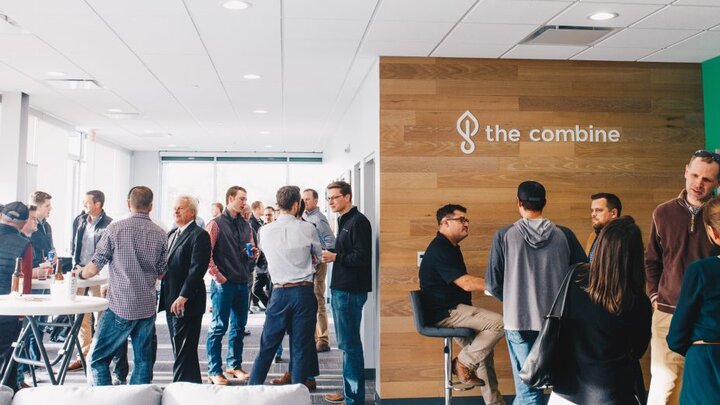On Nebraska Innovation Campus, The Combine incubator hatches new agtech startups

Before Seattle-based Costco broke ground on its $280 million poultry operation in Fremont in 2017, Scott Niewohner remembers a conversation with his cousin about the pros and cons of building barns to raise chickens to supply the plant.
Chief among the cons, according to Niewohner’s cousin: daily retrieval of the dead birds scattered throughout the barns, which at a ‘typical’ capacity can contain up to 50,000 chickens at once.
“He said he wanted nothing to do with picking up all those dead birds every day,” Niewohner remembers.
But one cousin’s dread chore is another’s big idea. And while the Herman native and serial entrepreneur wants little more to do with chicken carcasses than his cousin, Niewohner found inspiration for his latest endeavor in his teenage son’s then-incipient proclivity for robotics: “I thought about my son’s robotics club, and I realized we’ve been doing this for years: picking up a ball and moving it to a box across the room.”
Years later, and as the Niewohners get closer to their next milestone as a Nebraska-based agtech startup, they’re still pulling themselves along by the bootstraps. But they aren’t going it alone.
Birds Eye Technology is among six such startups currently wending their way through The Combine, a one-year-old incubator program based on the University of Nebraska-Lincoln’s Nebraska Innovation Campus. The Combine aims to capitalize on the ideas that form the core of companies like Birds Eye Technology and transform the potential for high growth into a reality.
“The mission here is to be the connective tissue that these rural entrepreneurs need to be successful,” said Matt Foley, program director at Invest Nebraska, which operates The Combine. “We’re building that trust between agri-tech entrepreneurs and the boots on the ground by fleshing out these business models, connecting them with the producers, and most importantly, making sure they’re really solving a problem within the industry by validating the technology.”
Instead of the common cohort model where incubator participants enter, proceed through, and finish an incubator program as a unit, The Combine takes companies through its programming on a rolling basis both on-campus at NIC and virtually. Foley said that’s critical to ensuring that entrepreneurs west of the Lincoln and Omaha metro areas also have an opportunity to scale their incipient enterprises: “(We hope The Combine serves) a segment of the population that a lot of times has been left out of the conversation as far as high-tech entrepreneurship in Nebraska goes.”
The agtech space is lucrative, and growing fast. It comprised $4.7 billion in funding across nearly 700 deals in 2019, according to Silicon Valley-based agtech venture capital firm AgFunder; that’s up from deal volume of $2.1 billion in 2015 and volume of about $1 billion in 2012 and 2013.
The Combine’s network of Invest Nebraska-connected mentors and investors will complement a growing partnership network that will help validate participants’ pitches. It includes organizations like Nebraska Farm Bureau, Nebraska Corn Board, and UNL’s Institute of Agriculture and Natural Resources, all of which have a statewide reach and deep relationships among the Nebraska agriculture community.
A $600,000 federal grant awarded to Invest Nebraska from the U.S. Department of Commerce Economic Development Administration in late September will help cement those partnerships and reinforce The Combine’s mission. So far, the incubator has assisted approximately 10 companies, and Foley is optimistic that the federal grant will help boost capacity to bring even more Nebraska startups into the fold.
With Costco now relying on northeast Nebraska producers to supply its $4.99 rotisserie chickens, Niewohner and his son, Lucas, are in the home stretch of ironing out the wrinkles in the demo unit that is the cornerstone of their endeavor.
When that work is complete in the coming weeks, the Niewohners will have a fully autonomous, LIDAR-guided robot that uses AI to differentiate dead birds from live ones in poultry barns and remove them from the barn. Niewohner says the breadth of knowledge and expertise he can access as a Combine participant makes all the difference as he and his son approach the milestone.
“It gives us the confidence that we’re not as far off track as we thought we could have been. With Invest Nebraska committing time to us (through The Combine), we know that most anybody in Nebraska has heard of them, and if they haven’t, they can look them up and see that there’s credibility here,” Niewohner said. “We have this force behind us and that means something.”
By: SPN Newsroom
